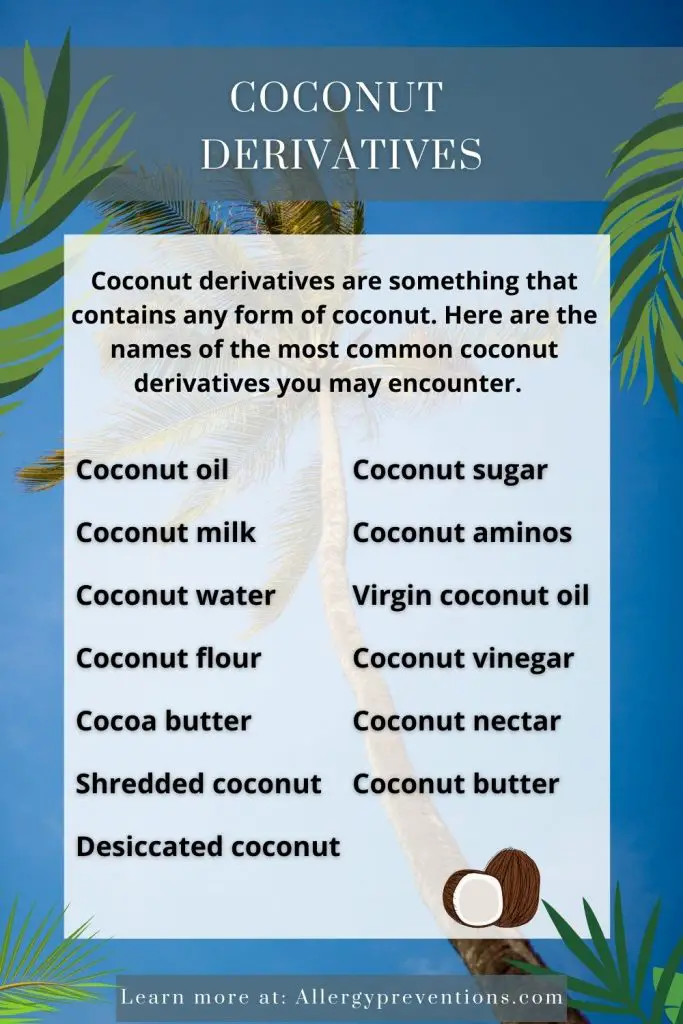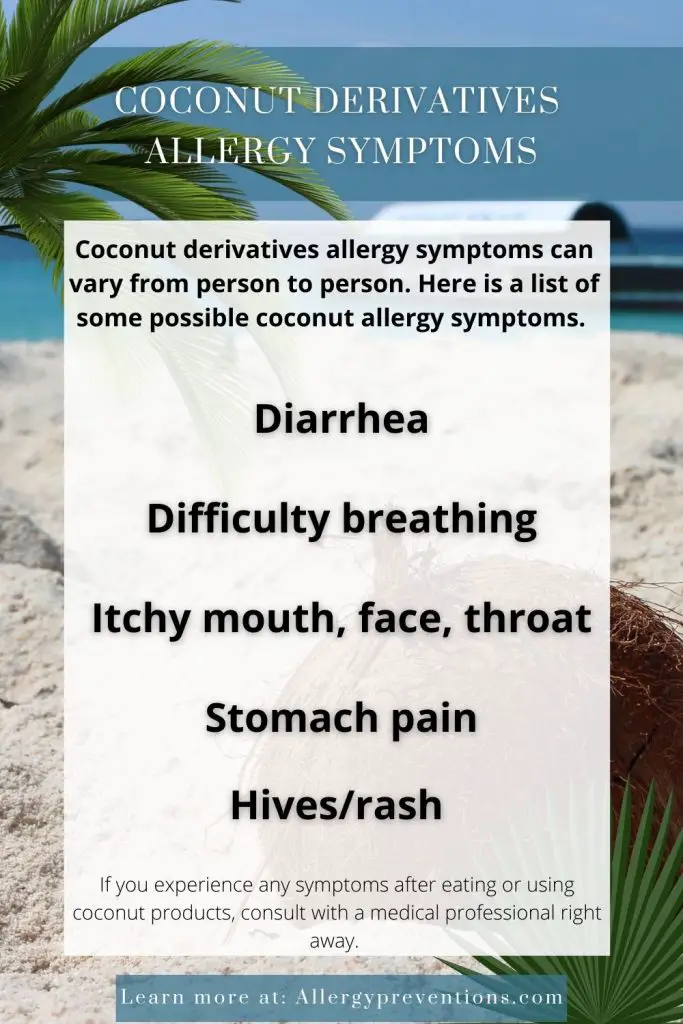If you’re one of the millions of people who suffer from a coconut derivatives allergy, this post is for you. Here we’ll discuss all you need to know about this type of allergy, from symptoms to treatment. We hope that this information will help make living with your allergy a little bit easier.
Coconut derivatives are a form of allergy that can affect coconut consumers. Coconut allergies aren’t as frequent as other types of allergies, but they can be just as severe.

What are coconut derivatives?
Coconut derivatives are anything made from or containing coconut. This includes coconut oil, coconut water, and even shavings from the fruit itself. The most common form of coconut derivative allergy is contact dermatitis, which occurs when the allergen comes into contact with your skin.
List of coconut derivatives

There are many different types of coconut derivatives. Here is a list of some of the most common:
- Coconut oil
- Coconut milk
- Coconut water
- Coconut flour
- Desiccated coconut
- Cocoa butter
- Shredded coconut
- Coconut sugar
- Coconut aminos
- Virgin coconut oil
- Coconut vinegar
- Coconut nectar
- Coconut butter
Causes of Coconut Derivatives Allergy
Coconut derivatives allergies are caused by an immune system reaction to the proteins found in coconuts. When you have a coconut allergy, your body mistakenly believes that the coconut proteins are harmful. In response, your immune system produces antibodies called immunoglobulin E (IgE) to protect you from the proteins.
When you come into contact with the allergen, your body releases histamine and other chemicals. These chemicals cause the symptoms of an allergic reaction.
Symptoms of Coconut derivatives allergy

The first step in identifying a coconut allergy is to pay attention to the symptoms you experience after consuming products that contain coconut. Coconut allergies can cause a variety of symptoms, including:
- Diarrhea
- Difficulty breathing
- Itchy mouth, face, throat
- Stomach pain
- Hives/rash (physical coconut contact)
If you experience any of these symptoms after consuming products that contain coconut, it’s important to seek immediate medical assistance (if life-threatening) or an allergist for further testing.
How is Coconut Allergy Diagnosed?
If you think you may have a coconut allergy, the best thing to do is to see an allergist. Allergists are specially trained to diagnose and treat allergies. An allergist can perform a skin prick test, blood test, or food challenge to determine if you are allergic to coconut. Once your allergy is confirmed, the allergist will work with you to create a treatment plan.
Skin Prick Test
A skin prick test is a common way to diagnose coconut allergies. During this test, a small amount of coconut extract is placed on the skin and then pricked with a needle. If you are allergic to coconut, you will develop a red, itchy rash at the site of the prick.
Blood Test
A blood test can also be used to diagnose coconut allergies. This test measures the levels of coconut-specific antibodies in your blood. If you are allergic to coconut, your blood will contain high levels of these antibodies.
Food Challenge
In some cases, an allergist may perform a food challenge to confirm a coconut allergy. This test is usually done in a hospital or clinic setting. During the test, you will be given small amounts of coconut to eat. The allergist will then monitor you for signs and symptoms of an allergic reaction. A food challenge is considered the gold standard for diagnosing food allergies
Additionally, your doctor or allergist may want you to keep a food diary. A food diary will help them identify patterns between what you are eating and your symptoms.
Treatment for Coconut derivatives allergy
If you have a coconut allergy, the best thing to do is to avoid consuming or using products that contain coconut. This can be difficult because coconut is found in many different foods and products. However, with careful label reading and communication with manufacturers, it is possible to avoid coconut-containing products.
Can you take antihistamines for coconut derivatives allergies?
Yes, you can take antihistamines for coconut derivatives allergies. Antihistamines can help to reduce the symptoms of an allergic reaction. However, they will not stop the reaction from occurring.
What should you do if you have a severe reaction?
If you have a severe reaction, you should use your epinephrine auto-injector and then call 911. Epinephrine is the only medication that can stop a severe allergic reaction. After you use your epinephrine auto-injector, you will need to go to the hospital for further treatment.
How to prevent Coconut derivatives allergy
There is no way to prevent having a coconut allergy (no cure). However, you can avoid products that contain coconut if you are allergic to it. Avoidance will prevent the symptoms of allergies. To do this, you need to be aware of the many different products that contain coconut and read the labels carefully. You should also communicate with manufacturers about your allergy and ask them about the ingredients in their products.
FAQs About Coconut Derivatives Allergy
Q: What is a coconut derivative?
A: A coconut derivative is a product that is made from coconut. This includes coconut oil, coconut milk, and coconut flour.
Q: Are all products that contain coconut derivatives dangerous for people with a coconut allergy?
A: No, not all products that contain coconut derivatives are dangerous for people with a coconut allergy. However, they should still be avoided (why take the risk). It is important to read the labels carefully and avoid any product that contains coconut.
Final Thoughts
There you have it, all the current information on coconut derivatives allergy.
How has this allergy affected you? I am interested to hear your thoughts and questions! Email me at chris@allergypreventions.com
Need more on Coconut Allergies?
